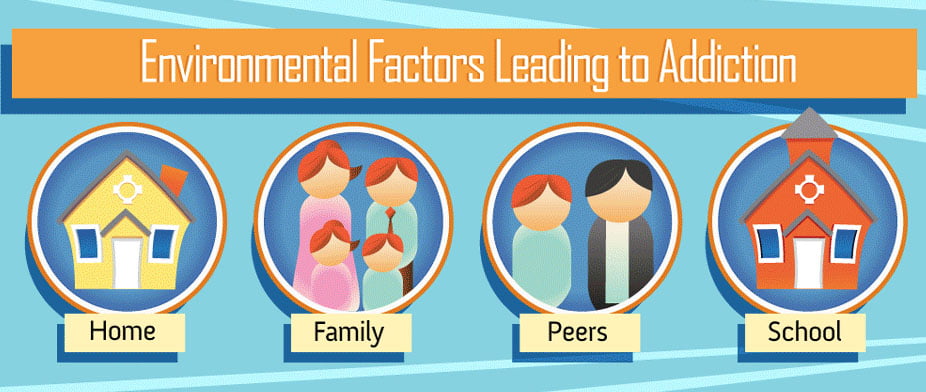The debate on whether the environment or genetics lead to alcohol addiction continues. But, most people have said that both the environment and genetics can lead to alcoholism. Genetics has a significant role to play in addiction.
A person with a family member like a father or mother that is an alcoholic may have a genetic makeup that makes them more prone to alcoholism than other people. However, this influence shouldn’t be taken to mean that the person will automatically become an alcoholic. Nevertheless, knowing how the environment increases the chances of becoming an alcoholic is very important.
Environments that Increase the Chances of Becoming an Alcoholic
Some risk factors for alcohol addiction are related to the environment. These include places, people, issues, and things that surround a person regularly. Some health experts argue that work, home, and social events’ environments affect how a person drinks alcohol profoundly. For instance, if a person socializes with many friends that drink alcohol, they have higher chances of drinking. But, if a person socializes with non-drinking friends, they are less likely to drink.
If a person works with peers that drink almost every day after work, their chances of joining them are very high. And, a routine that entails drinking every day can eventually lead to alcohol addiction and the need to call a https://addictionresource.com/addiction-and-rehab-hotlines/ at some point. For some people, drinking every day might not be a serious problem. Nevertheless, some individuals can develop alcohol addiction faster than others. Essentially, alcohol addiction differs from one person to another.
A person can be left out of a group of peers that go out to drink every day. This can make them feel isolated and probably go home to drink alone. This can also become a habit that will lead to alcohol addiction.
Other Environments that May Increase the Chances of Becoming an Alcoholic
Research has shown that children that grow up in families where alcohol consumption is seen as something normal lean towards drinking alcohol. Some researchers have speculated that individuals that grow up in families with single parents have increased chances of becoming alcoholics.
Some of the risk factors that can lead to alcohol addiction concerning the environment include:
● Community
● Peers
● Trauma
● School
● Media
● Workplace
A person whose place of work is stressful is likely to drink after going home every day to relax. When the person does this severally, their consumption level may eventually increase and lead to alcohol addiction. Thus, though a person may not be out drinking with peers, their workplace environment can lead to their alcohol use.
This can happen if a person experiences high-stress and pressure at their workplace. What’s more, if employees fail to get along well in their work environments, a stressful situation can arise. This can make an employee drink after getting home every day. Eventually, they may have to call rehab seeking assistance.
Alcohol Abuse among Young Adults and Teens
School relations, both in high school for teens and college for young adults, can play a major role in drinking. They can also lead to eventual alcohol addiction and the use of other drugs. On getting into a party scene, a college student can face an environment that increases their chances of drinking alcohol and becoming an addict. In their efforts to be accepted by their new cliques, high school teens can drink alcohol trying to fit in what is considered as the “cool crowd”.
Research has shown that a child that experiences abuse is likely to develop an addiction to alcohol or other drugs in their adult life. This is true for children that experience different types of abuse or trauma in their childhood. Therefore, if a child is brought up in an environment where domestic violence or abuse is prevalent, they have a higher chance of becoming alcoholics.
This is also the case for individuals that serve in war zones or military environments where they watch their peers sustain wounds, injuries, and even get killed. Their chances of abusing alcohol and other addictive substances after leaving such environments are higher.
The community and the media can also influence adolescents that watch other people’s behaviors. Movies and televisions glorify drug use and alcohol consumption. In some cases, they show it as a nice way to have fun. They do not show the consequences of alcohol consumption and drug use. When a person lives in a community where alcohol addiction and drug use are prevalent, their chances of becoming an alcoholic are higher.
That’s because they are likely to engage in the same activities with the individuals that use drugs and drink alcohol. This makes them more prone to alcohol consumption and other addictive behaviors. Eventually, they might have to seek help by calling the national addiction hotline.
Social and Environmental Factors
The environment of a person and how they experience cultural and social influences can affect how they perceive drugs and alcohol abuse. Some social and environmental elements can lead to more frequent drinking episodes and the need to call a drug helpline in the future.
Such elements may include:
- Partners or friends that drink
- Easy alcohol access at home or workplace
- Peer pressure
- Desiring to fit in
- Poverty
- The glamorization of alcohol abuse by the media
- Watching peers, parents, and role models abuse alcohol
Relationships and circumstances within the day-to-day life of a person can also be risk factors for alcohol consumption and addiction. These can include career or job struggles, relationship conflicts, stress, and difficulties getting help.
The Bottom Line
Alcohol addiction or alcoholism can be caused by different factors, including the environment. Essentially, the environment where a person grows up and lives in, as well as, where they work can contribute to their excessive drinking and the eventual need to call a drug hotline number seeking assistance. While not everybody turns to drugs or alcohol to relieve the stress posed by their environments, some people do. Some people become heavy drinkers because they turn to alcohol to resolve the problems caused by their environments. Unfortunately, daily drinking leads to alcohol addiction. If such people don’t seek treatment, their lives can be ruined and even death can occur.







